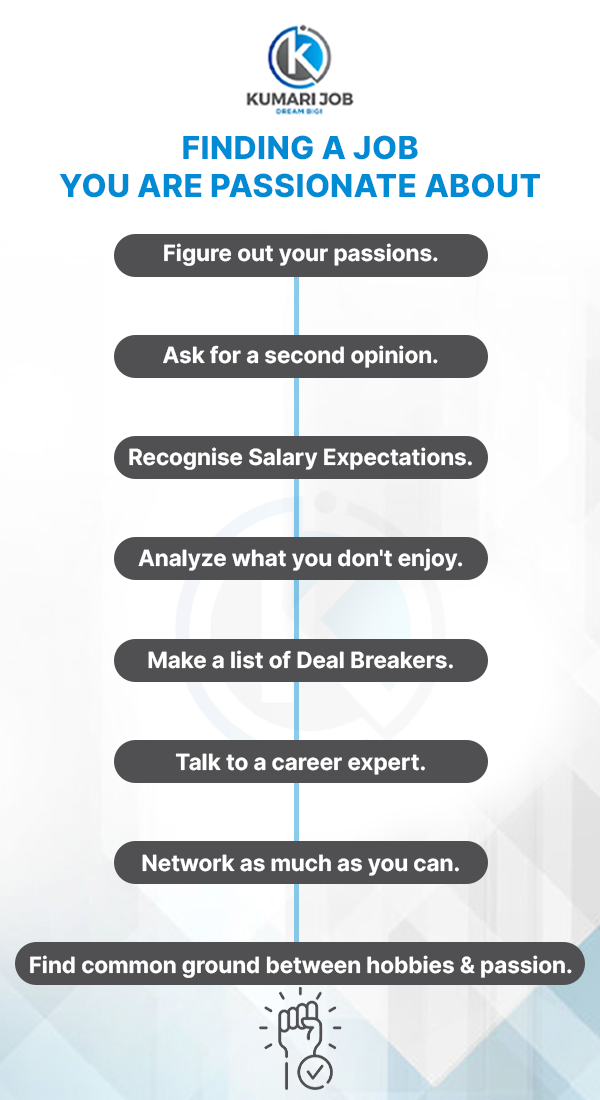
Introduction
Imagine a work environment like your dream job, with a healthy work-life balance and an inviting company culture. This would reflect your current job and contribute to your career path and well-being. Finding a job you are passionate about and aligns with 'What is your passion in life?' is crucial for your career path and well-being. Happy workers are 13% more productive, which can benefit you and your team. However, finding the right job can be challenging, as it may not be easily found through LinkedIn or day-to-day duties. Understanding what to look for in job descriptions, what your dream job truly is, and considering 'what is your passion in life?' can help you find the right one. This article will guide you through the steps to find a job you love.
In this blog
Take a step-by-step Approach
1. Identify your strengths and Weaknesses:
- Understanding strengths and weaknesses is crucial for a strategic approach to job searching and finding a job you are passionate about.
- Awareness of strengths helps target roles aligned with one's skills and passion.
- Recognising weaknesses empowers seeking opportunities for skill-building and development.
- Self-awareness aids in setting realistic career goals and continual forward movement.
- Introspection, creating lists of strengths and weaknesses, and identifying passion are integral steps.
- Investing time in this process will likely pay off in pursuing one's dream job.
2. Talk to a career expert.
- Speaking with a career consultant is crucial in finding a job aligned with your passion.
- Career consultants possess valuable knowledge and skills in navigating the complex world of careers.
- They provide priceless information on fields, jobs, and opportunities matching your hobbies and strengths.
- Customized examinations offered by career experts help better understand your professional profile.
- Career consultants advise improving resumes, preparing for interviews, and negotiating job offers.
- They often have extensive networks, opening doors to untapped job markets and unavailable positions.
3. Network as much as you can.
- Talking to industry experts offers insights into day-to-day job operations.
- Conversations with current employees provide a firsthand view of workplace dynamics, culture, and career opportunities.
- It helps learn more about the position, gain insider perspectives, and understand potential difficulties not evident in job postings.
- Attending conferences, workshops, and events broadens your professional network and contributes to finding a job you are passionate about.
- These events facilitate meeting like-minded individuals, mentors, and potential employers.
- Building connections yields knowledge about various career paths and reveals unexpected job openings.
- Joining online forums or professional communities enhances knowledge, identifies trends, and connects with current talent.
- Proactive networking guides your career towards positions aligned with your goals.
More on: https://www.kumarijob.com/blog/career-tips/networking-connections
4. Break down your fears so they can be overcome.
- Pursuing passion may trigger resistance, often fueled by fears of failure, success, visibility, and vulnerability.
- Rational voices often discourage following one's passion, creating worries that hinder enthusiasm.
- Identifying and addressing the underlying fears is crucial for overcoming resistance.
- Uncover conditioned fears from various sources like parents, school, lovers, and coworkers.
- Reassure and align resistant parts by understanding the conditioning and navigating its impact.
- Address specific concerns, such as financial worries, by saving money before making significant decisions.
- Overcome doubts about abilities or knowledge by examining the reasons behind such beliefs.
- Evaluate if worries are genuine or stem from a desire for improvement.
5. Look for similarities between the things you like.
- Harmonize your interests to find a job that you are passionate about.
- Identify and appreciate your natural talents as the foundation for a successful career.
- Consider pursuits and skills that bring you fulfilment and joy.
- Look for recurring themes in your interests and skills.
- For example, a content strategy role may be satisfying if you enjoy creative writing and digital marketing.
- Find a career that complements your unique combination of skills and interests.
- Seek jobs and settings that allow your interests to flourish.
- With perseverance and an open mind, design a job that highlights your unique skills and passions for a fulfilling professional life.
Here are four additional benefits of having a job you enjoy
- You're happy at work, and happy employees are more productive than unhappy ones.
- Being passionate about your work will increase your drive and desire to perform at your best.
- Since happy workers perform better at work, the quality of your work increases.
- Your job gets better because happy employees work harder.
Follow these guidelines to land your desired job
1. Figure out your passions:
- Knowing yourself better is essential for discovering a career aligned with your interests and values.
- Reflect on activities that genuinely provide a sense of fulfilment and purpose.
- Consider hobbies or actions that make you feel engaged and satisfied.
- Evaluate aspects of past positions that resonated with you and those that didn't, all in the context of finding your passion and purpose.
- Develop a high level of self-awareness to identify opportunities aligning with your true purpose.
- This self-awareness can lead to a satisfying career transition and bring you closer to a job you're genuinely enthusiastic about.
2. Ask for a second opinion:
- Seek a second, unbiased view even when you are in charge.
- Obtain advice from close friends or family members for insightful information and reminders.
- Like academic and career demands, life's obligations can lead to forgetting true passions.
- Example: Volunteering at an animal shelter during college may have been overlooked.
- Reflect on past activities that light up your spirits and bring fulfilment.
- Consider that a role in education or establishing environmental policies might align with your true passions and bring satisfaction and purpose.
3. Recognize salary expectations:
- Recognize the importance of financial security in professional decision-making.
- Balancing personal interests and expected revenue is critical when pursuing your passion.
- Analyze your targeted minimum wage to achieve a rewarding and financially successful career.
- Assess living costs, financial objectives, and lifestyle needs to establish a baseline for discussions and job offers.
- Enter salary negotiations with a clear plan of attack, ensuring a more effective outcome in finding a job you are passionate about.
- Offering a lesser income as a negotiating tactic is found to be ineffective for securing a higher paycheck.
- Productive conversations about fair and competitive compensation with prospective employers lead to more satisfying results.
4. Analyse what you don't enjoy
- Finding passion and purpose is crucial for a fulfilling life and career.
- Recognize and evaluate aspects that don't align with your passions.
- Self-awareness enhances the ability to make wise choices about surroundings and activities.
- Living a true life involves embracing both loves and dislikes.
- Developing a comprehensive self-picture ensures alignment with your real purpose and calling, facilitating the process of finding a job you are passionate about.
- Making choices aligning with your true self contributes to a more fulfilling and authentic life.
5. Make a List of Dealbreakers
- Be aware of dealbreakers when seeking a profession aligned with passion.
- Dealbreakers are non-negotiable elements influencing job satisfaction.
- Reflect on past experiences to identify unsatisfactory or disappointing aspects.
- Examples of dealbreakers include a bad work environment, lack of advancement prospects, or conflicts with principles.
- Consider lifestyle requirements and personal preferences, such as prioritising flexible hours over a healthy work-life balance.
- Being proactive about dealbreakers can expedite the job search and enhance the likelihood of finding a job that meets professional and personal goals.
6. Craft a Personal Brand
- Define your unique professional identity and strengths.
- Develop a personal brand that communicates your values and expertise.
- Align your brand with your desired career path.
- Consistent branding enhances recognition among potential employers.
- Use your brand in resumes, cover letters, and online profiles.
7. Explore Company Cultures
- Investigate and understand the cultures of potential employers.
- Reflect on past work environments that were conducive or challenging.
- Consider values and workstyles that align with your preferences.
- A harmonious company culture contributes to job satisfaction.
- Seek organisations that share your values and support your professional growth, contributing to finding a job you are passionate about.
8. Set Boundaries for Work-Life Integration
- Differentiate between work-life balance and integration.
- Establish clear boundaries to manage work-related stress.
- Consider remote work options or flexible schedules that align with your lifestyle.
- Prioritize mental health and well-being in your career choices.
- Seek employers who promote healthy work-life integration.
9. Leverage Informational Interviews
- Conduct informational interviews with professionals in your desired field.
- Gain insights into industry trends, job responsibilities, and company cultures.
- Build relationships with professionals who can offer guidance.
- Informational interviews provide a realistic preview of potential careers.
- Use these insights to refine your job search strategy and target roles aligned with your aspirations.
10. Create a Skills Inventory
- Identify and list your key skills, both technical and soft.
- Recognize areas where you excel and those you want to develop.
- Tailor your job search to roles that leverage your strengths.
- Continuous skill assessment ensures alignment with evolving career goals.
- Use your skills inventory to articulate your value during interviews.
Conclusion
You might wonder what to do if you can't find a job you love. The answer: keep trying. Finding a job that you are passionate about can be challenging, but it's always there. By creating an action plan and learning wise advice, you're working hard for a prosperous future, identifying your needs and desired outcomes.
Choosing a career you enjoy will benefit you professionally and personally because it gives your life significance, and you will support your team's efforts and enjoy better working relationships with your bosses and coworkers.
Whatever your interests are, pursue a career that reflects them. You won't be sorry.
More career tips: https://www.kumarijob.com/blog/career-tips.
Frequently Asked Questions
Pursuing a passion-driven career leads to greater job satisfaction, personal fulfilment, and, often, higher performance.
No, there is always time to realign your career with your passions; many successful individuals have made significant shifts later in their professional lives.
Finding a job you are passionate about is crucial because it leads to greater job satisfaction, personal fulfilment, and, often, higher performance levels.
Continuously seek growth opportunities, set clear goals, and find ways to contribute your unique strengths and talents to your workplace.
To create your path, consider exploring related fields or industries with similar elements or entrepreneurial opportunities.
Assess which passion aligns best with your long-term goals, values, and lifestyle, and consider how it can be integrated into a fulfilling career.











Loading Comments...